小学六年级下册一般过去时PPT(精讲)
六年级下册英语-小升初总复习-时态全解-人教版PEP(共29张PPT)
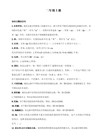
将来时理论
一、 概念:表示将要发生的动作或存在的状态及打算、 计划或准备做某事。 句中一般有以下时间状语: tomorrow, next day(week, month, year…),
soon, the day after tomorrow(后天) this morning , this afternoon , this evening等。
试题演练:
三、 选择正确的答案。 B presents for my parents yesterday. 1. I ____ A. buyed B. bought C. buying C 2. Susan _____ swimming yesterday. A. go B. goes C. went B 3. Danny _____ breakfast five times last week. A. eat B. ate C. eated C Tree Planting Day. 4. Last Sunday____ A. is B. were C. was
试题演练:
一、写出下列动词的过去式或动词原形。 went was 1. go_______ 2. is___________ Lorem ipsum dolor bought 3.buy_______ 5. have had ____
sit amet, consectetur adipisicing elit, sed do eiusmod tempor incididunt ut labore
swam 4.swim__________
6. watched watch _____
eat 7. ate______
get 8. got__________
一般过去时(讲义)-人教PEP版英语六年级下册
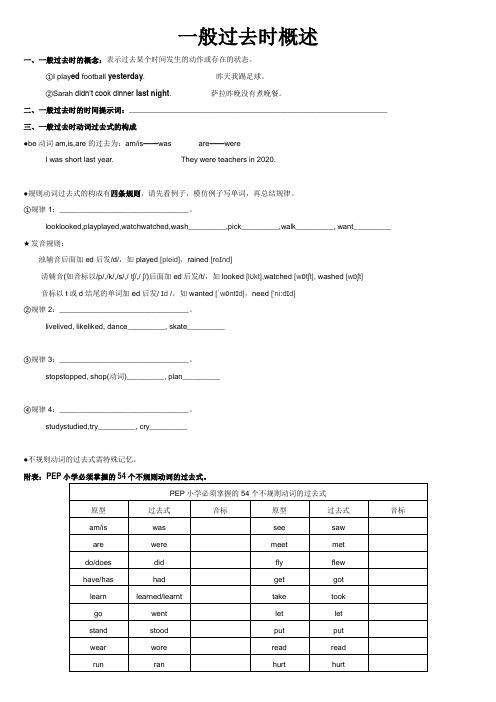
一般过去时概述一、一般过去时的概念:表示过去某个时间发生的动作或存在的状态。
①I play ed football yesterday. 昨天我踢足球。
②Sarah didn’t cook dinner last night. 萨拉昨晚没有煮晚餐。
二、一般过去时的时间提示词:______________________________________________________________三、一般过去时动词过去式的构成●be动词am,is,are的过去为:am/is——was are——wereI was short last year. They were teachers in 2020.●规则动词过去式的构成有四条规则,请先看例子,模仿例子写单词,再总结规律。
①规律1:_______________________________。
looklooked,playplayed,watchwatched,wash_________,pick_________,walk_________, want_________ ★发音规则:浊辅音后面加ed后发/d/,如played [pleid],rained [reɪnd]清辅音(如音标以/p/,/k/,/s/,/ tʃ/,/ʃ/)后面加ed后发/t/,如looked [lʊkt],watched [wɒtʃt], washed [wɒʃt]音标以t或d结尾的单词加ed后发/ɪd /,如wanted [ˈwɒntɪd],need ['ni:dɪd]②规律2:_______________________________。
livelived, likeliked, dance_________, skate_________③规律3:_______________________________。
stopstopped, shop(动词)_________, plan_________④规律4:_______________________________。
六年级下册英语-小升初英语专题精讲 时态-一般过去时 全国通用PPT精美版

句型转换
课堂练习
1. l usually go to the park. (用yesteday 替换usally 改写句子)
二、一般过去时的构成
新知讲解
2、没有be动词的一般过去时的构成
没有be动词的一般过去时由动词的过去式构成。在构成否定句及疑同句
时一般都借助助动词 did.原来的动词改为原形,句末加问号。例如:
陈述句:I dropped my ice cream!我掉了我的冰淇淋!
一般疑问句: Did you drop your ice cream?
【专题课件】小升初英语专题精讲
第二十讲 时态-一般过去时(超全精编版)
新知导入
一、一般过去时的概念及作用 1.一般过去时表示过去某个时间发生的动作或存在的状态,常和表示过 去的时间状语连用。例如:
我妈妈的手提包刚才在沙发上。 My mother's handbag was on the sofa just now. 上周我们去了农场。 We went to the farm last week.
课堂练习
用所给动词的适当形式填空. 1. My cousin_g_a_v_e_ ( give) me a present yesterday. 解析:句子中有yesterday,意思是昨天,所以句子发生在过去,用一般 过去时,故填gave。
课堂练习
用所给动词的适当形式填空. 2.We_w_e_r_e_ (be) on the farm last Friday. 解析:主语是we,be动词选择are,因为句子中有last Friday,意思是上 周五,所以句子发生在过去,用一般过去时,故填were。
否定句: I didn't drop my ice cream!
英语人教版六年级下册《一般过去时》
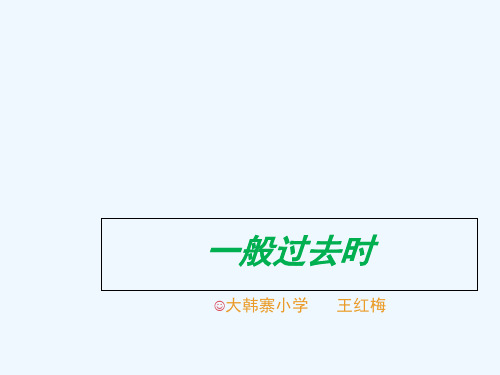
大韩寨小学
王红梅
一、一般过去时肯定句构成
1、主语+was/were + 表语。 eg: He was quiet before. eg: You were short 3 years ago. 2、主语+动词过去式+宾语。 eg:My uncle went to Shanghai yesterday.
二、一般过去时否定句构成
1、主语+was/were+表语。此时直接在was/were后面加not即可。
He eg:
主语+wasn't/weren't+表语。 was quiet before. (改为否定句形式) He wasn't quiet before. were short 3 years ago. (改为否定句形式) 即可。 You weren't short 3 years ago. 主语+didn't+动词原形+宾语。
My eg:
三、一般过去时一般疑问句构成
1、主语+was/were eg: eg:
+ 表语。此时需要把was/were 提前即可。
Was/Were + 主语+表语? He was quiet before. (改为一般疑问句句形式) Was he quiet before? They were short 3 years ago. (改为一般疑问句句形式) Were they short 3 years ago?
2、主语+动词过去式+宾语。此时需要用到助动词did置于句首,并且后面的谓语动词要用原形。
Did +主语+动词原形+宾语?
六年级一般过去时 ppt课件
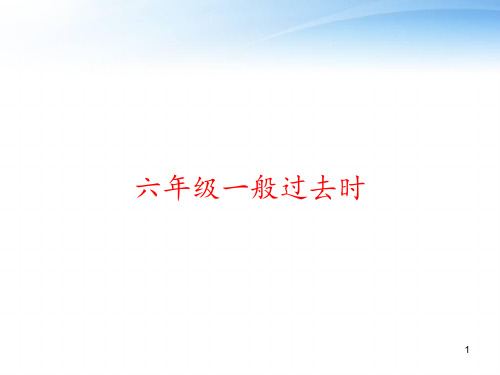
笨,没有学问无颜见爹娘 ……” • “太阳当空照,花儿对我笑,小鸟说早早早……”
4
过去式的句子结构
1.主语 + be(was/were) 2.主语 + -ed
5. 13. do ______ 14. teach _______ 15. win ______
6. 16. like _______ 17. write _______ 18. cry ______
7. 19. study _____ 20. ask __________ e ______
7
3、辅音字母加y结尾,把y改成i,在加-ed
study---studied carry---carried
下面的动词过去式变化对吗?
× × × stay---staied play---plaied say---saied
stayed
played
said
8
4、以重读闭音节结尾的动词,末尾只有 一个辅音字母,双写这个辅音字母再加-ed。
六年级一般过去时
1
过去式
表示过去 时间内发生的
标志词
1、yesterday, last week/year/month… the day before yesterday,
just now等 2、two years ago
at that time before等
3、in +过去年份
2
精品资料
• 你怎么称呼老师? • 如果老师最后没有总结一节课的重点的难点,你
13
6. We ___ to the zoo and __a lot of animals yyeesstteerrddaayy. A. go; see B. went; saw C. goes; sees
小学六年级下册英语小升初时态课件(通用版) 一般过去时总复习2

4.疑问was/were调句首
• Were you at home the day before yesterday﹖ • Was she happy this morning﹖
肯定回答 Yes, 主语+was/were. 否定回答 No, 主语+wasn't/weren't. Were Xiao Qiang and Xiao Long here just now﹖
• yesterday或以其构成的短语: • yesterday morning • yesterday afternoon • yesterday evening • the day before yesterday
three days ago
Miss Zhu went to Tiantian Market three days ago.
其他家族
Long long ago
yesterday Now
一般过去时 yesterday ago just now in the old days in those days in 1980 the other day at that time once upon a time
一般将来时
现在 进行
• 现在学过的常用的表示过去的时间状语有: just now,a moment ago,yesterday,last week,last night, last weekend,last year,last month,three days ago,two weeks ago,five years ago…
• (3)末尾只有一个元音字母和一个辅音字母的重读闭音节,应 双写末尾的辅音字母,再加-ed,如:stop-stopped, shop-
小升初 六年级英语语法 一般过去时 动词过去式 课件ppt

3.They _____ in the USA last year.They _____ in China
now.
A.are ; were B.were ; are
C.was ; are
D.were ; was
Listen carefully
4. 实意动词过去式的变化规则
I walk to school every day.
一起练练吧
写出下列动词的过去式
like -- ______
do -- ______
dry -- ______
drop -- ______
think -- ______
know -- ______
sit -- ______
sleep -- ______
Listen carefully
一起练练吧
用动词的适当形式填空。 1)I _____ (have) an interesting party last weekend. 2)He _____ (watch) TV and _____ (read) a useful book yesterday. 3)They all _____ (go) to the mountains yesterday morning. 4)His father _____ (be) a taxi driver five years ago. 5)I _____ (take) some pictures yesterday.
我们就不:listen -- listened open -- opened visit -- visited
Listen carefully
口 诀:
• 过去式很简单,前提必须是动词 • 结尾有e只加d • 辅y结尾也不难,把y变i加ed • 末尾双写有哪些,辅音元音辅音记 • 其他动词很随和,带上ed成过去
小学六年级英语一般过去时
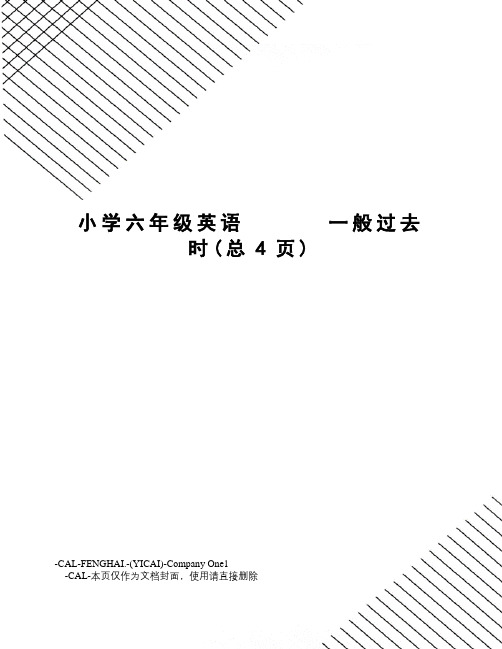
小学六年级英语一般过去时(总4页)-CAL-FENGHAI.-(YICAI)-Company One1-CAL-本页仅作为文档封面,使用请直接删除第十七讲一般过去时一. 概念一般过去时表示过去某个时间发生的动作或存在的状态,常和表示过去的时间状语连用。
一般过去时也表示过去经常或反复发生的动作。
例句:watched TV last night.我昨天晚上看电视。
did you do yesterday?你昨天做了什么?went to Beijing last year.他们去年去了北京。
二.用法1.表示过去发生的动作或状态,通常会有明确的表示过去的时间状语。
I went to the zoo yesterday.I stayed up last night.2.叙述过去连续发生的动作或状态。
This morning , I got up early , went out for a walk , then came back and cooked for my family .3.表示过去某一段不确定的时间内发生的动作或状态。
He worked in the store for 5 years.三.Be动词在一般过去时中的变化1. am 和is在一般过去时中变为was。
(was not=wasn't)2. are在一般过去时中变为were。
(were not=weren't)3. 带有was或were的句子,其否定、疑问的变化和is, am, are一样,即否定句在was或were后加not,一般疑问句把was或were调到句首。
四.句中没有be动词的一般过去时的句子1.否定句:didn't +动词原形,如:Jim didn't go home yesterday.2.一般疑问句:在句首加did,句子中的动词过去式变回原形。
如:Did Jim go home yesterday?3.特殊疑问句:疑问词+一般疑问句?如:What did Jim do yesterday?五.动词过去式变化规则1.一般在动词末尾加-ed,如:pull-pulled, cook-cooked2.结尾是e加d,如:taste-tasted3.末尾是辅音字母加一个元音字母和一个辅音字母的重读闭音节,应双写末尾的辅音字母,再加-ed,如:stop-stopped4.以“辅音字母+y”结尾的,变y为i,再加-ed,如:study-studied六.真题再现( ) 1. The boy the tree last week.A. is wateringB. watersC. watered2. I _____(see) his name in the newspaper yesterday.因为句中出现了表示过去的时间状语last week和yesterday,所以正确答案分别为:1. C精点精练一、用动词的适当形式填空。
- 1、下载文档前请自行甄别文档内容的完整性,平台不提供额外的编辑、内容补充、找答案等附加服务。
- 2、"仅部分预览"的文档,不可在线预览部分如存在完整性等问题,可反馈申请退款(可完整预览的文档不适用该条件!)。
- 3、如文档侵犯您的权益,请联系客服反馈,我们会尽快为您处理(人工客服工作时间:9:00-18:30)。
am/ is are
was were
每天,早餐我吃鸡蛋和牛奶。
I _h_a_v_eeggs and milk for breakfast every morning.
昨天,早餐我吃面条。
I __h_a_dnoodles for breakfast yesterday morning. 他每天都吃水果。 He _h_a_s__ fruit every day.
昨天他吃了3个苹果。 He __h_a_d_ 3 apples yesterday.
have/ has
had
I get up at 6:30 every morning. I __go_t up at 9:00 last Sunday.
He plays football every afternoon. He p_l_a_y_e_d basketball yesterday afternoon.
用于一般过去时的时间状语
1.与ago 连用:
a moment
two minutes
three hours
five days
ago
one week six months
I _c_o_u_l(dcan) ___ri_d_e(ride) the bike three years ago.
four years
Monday afternoon
5.与that 连用:
that
morning winter day year
6.其他时间状语:
just now in the old days in those days in 1980 the other day at that time once upon a time
我去年11岁. I ____ w11asyears old last year.
他现在在北京。 is
He ____ in Beijing now. 他昨天在上海。 He ____ inwaSshanghai yesterday.
他们今天在中国。 They ____ in Chianrae today.
2.与last 连用
last
3.与yesterday 连用:
time night week month term Monday
morning
yesterday afternoon
evening
the day before yesterday
4.与one 连用: morning
one
evening day
/Id/
/d/
/Id/
用法
1.在过去某一时间内发生的动作:
He got home at ten o’clock last night. 2.表示过去经常或反复发生的动作, 常与often,always等表示频度的 间状语连用:
I often got up very early at that time.
一般过去时:
“昨(天1)昨上天个:yXesXt(erd读ay,作后叉面叉可以)加前m,orninin加g,年af份ternwohone,n字eve连ning等 例:I __d_i_d____ (do) my homework yesterday evening.
Does he go to school by bus every day?
_D__idhe __g_oto school by bus yesterday?
don’t/ doesn’t
didn’t
do/ does
did
谓语构成
1.动词 be
was , were
2.动词 have, has 3.助动词do, does 4.行为动词用过去式
一般过去时态
什么是一般过去时?
动词的一般过去时态表示过去发生的动作、情况或存在的状态。
行为动词(即实义动词)的过去式没有人称和数的变化。
所有时态都是通过
动词
变化来表现的
Please look at the sentences
我今年12岁. I ___ 1a2myears old this year.
4.以辅音字母加y 结尾的词,先改 y为 i,再加ed
study — studied 5.不规则变化.(见不规则动词表P102)
规则动词过去式-ed的发音
1.在以清辅音结尾的规则动词后,
t -ed读作/ /
work ed
/w3:k/ t/
d 2.在以浊辅音或原音结尾的规则动词后, -ed读作/ /
liveed /lIv /d/
play ed /pleI /d/
3.在以/t/或/d/结尾的规则动词后,
dI -ed读作/ /
visit ed /’vIzIt /Id/
finished
/t/
enjoyed
shouted moved
/d/
/Id/
/d/
helped
/t/
wanted
called needed
had did
一般过去时以动词的过去式来表示, 没有人称和数的变化.(was,were除外)
I went to school yesterday. They went to school yesterday.
一般过去时的谓语构成:由动词的过去式构成 (参看书本)
规则变化
1.一般加ed work — worked 2.以e结尾加d like — liked 3.末尾只有一个辅音字母的重读闭 音节词,先双写这个辅音字母,再 加ed . stop — stopped
She doesn’t play basketball after school. She _d_i_d_n_’t_p_l_a_y basketball after school yesterday.
Do you go to school on foot every day?
_D_i_dyou _g_oto school on foot yesterday.
He does his homework every evening. He _d_id__ some reading last night.
动词原形、第三人称单数 动词过去式相同
They don’t watch TV in the evening.
They _d_id_n__’t_w__a_tcThV last night.
